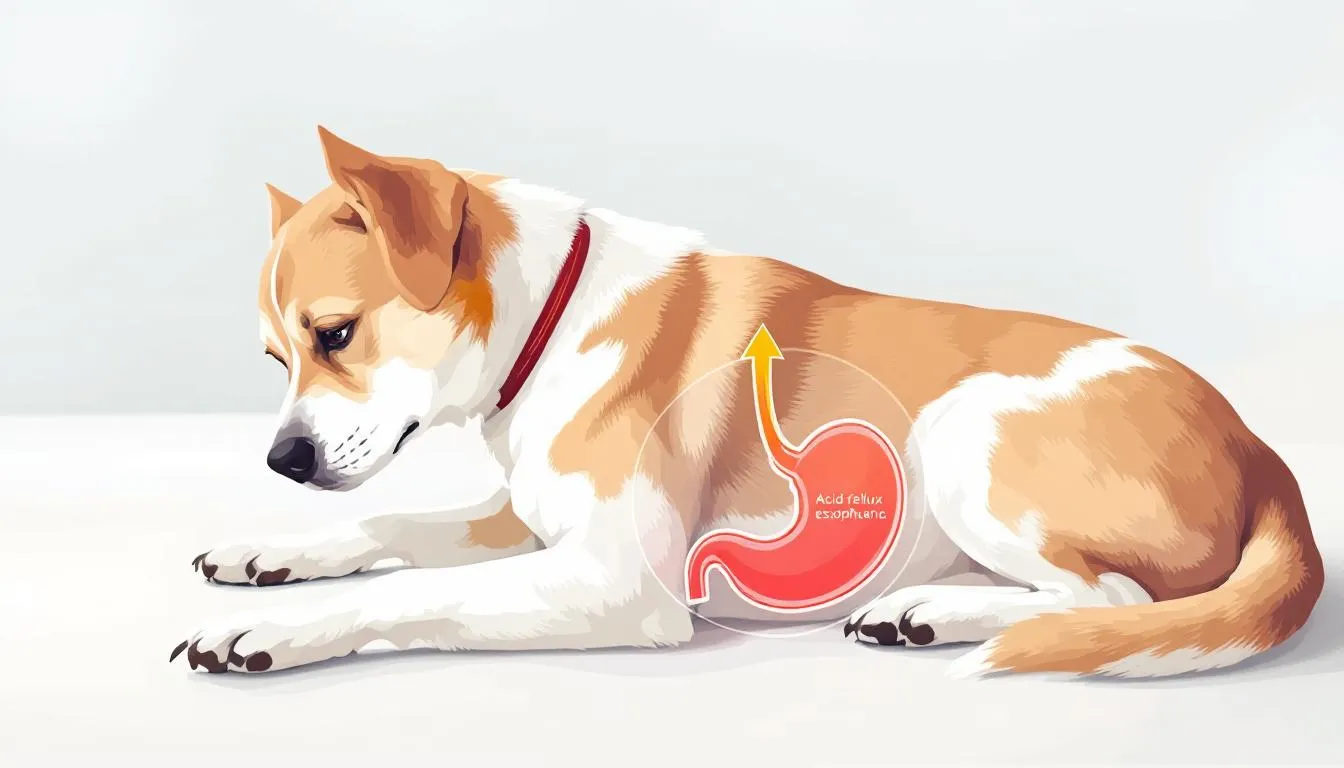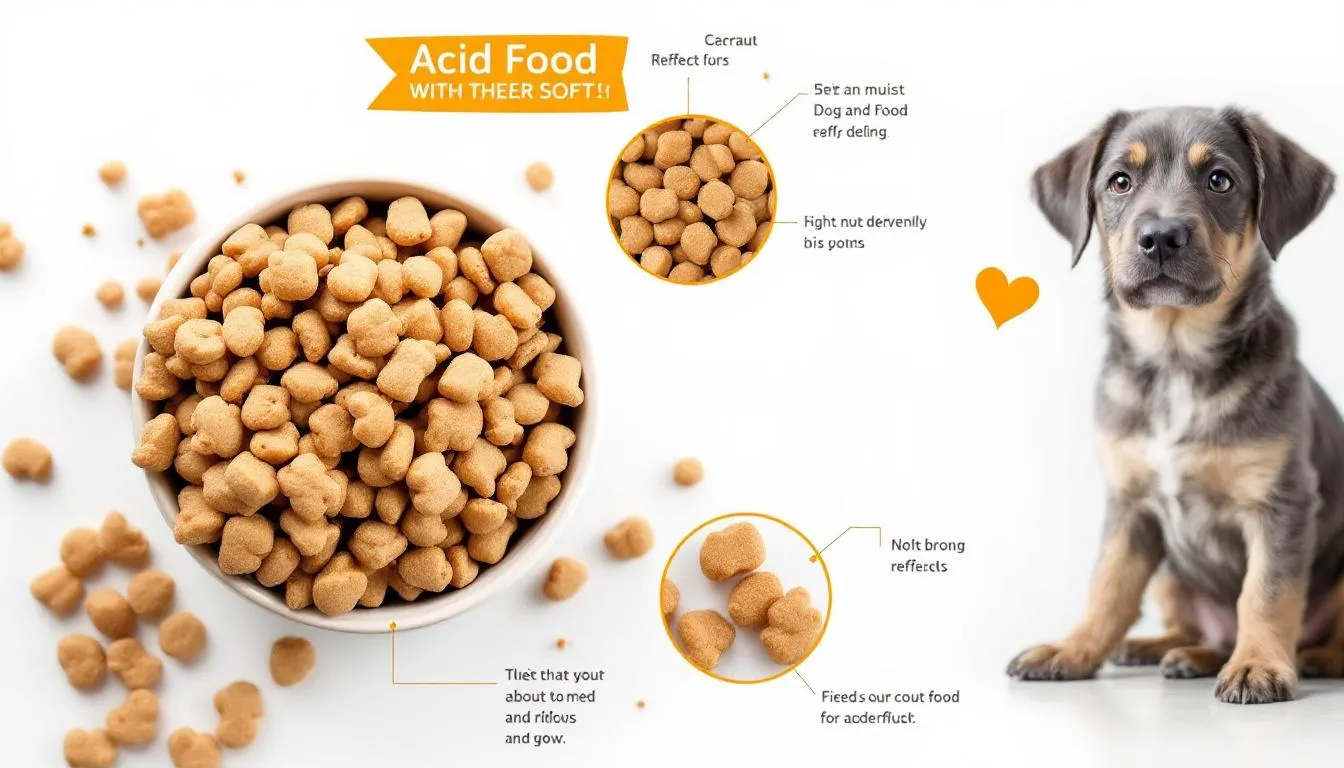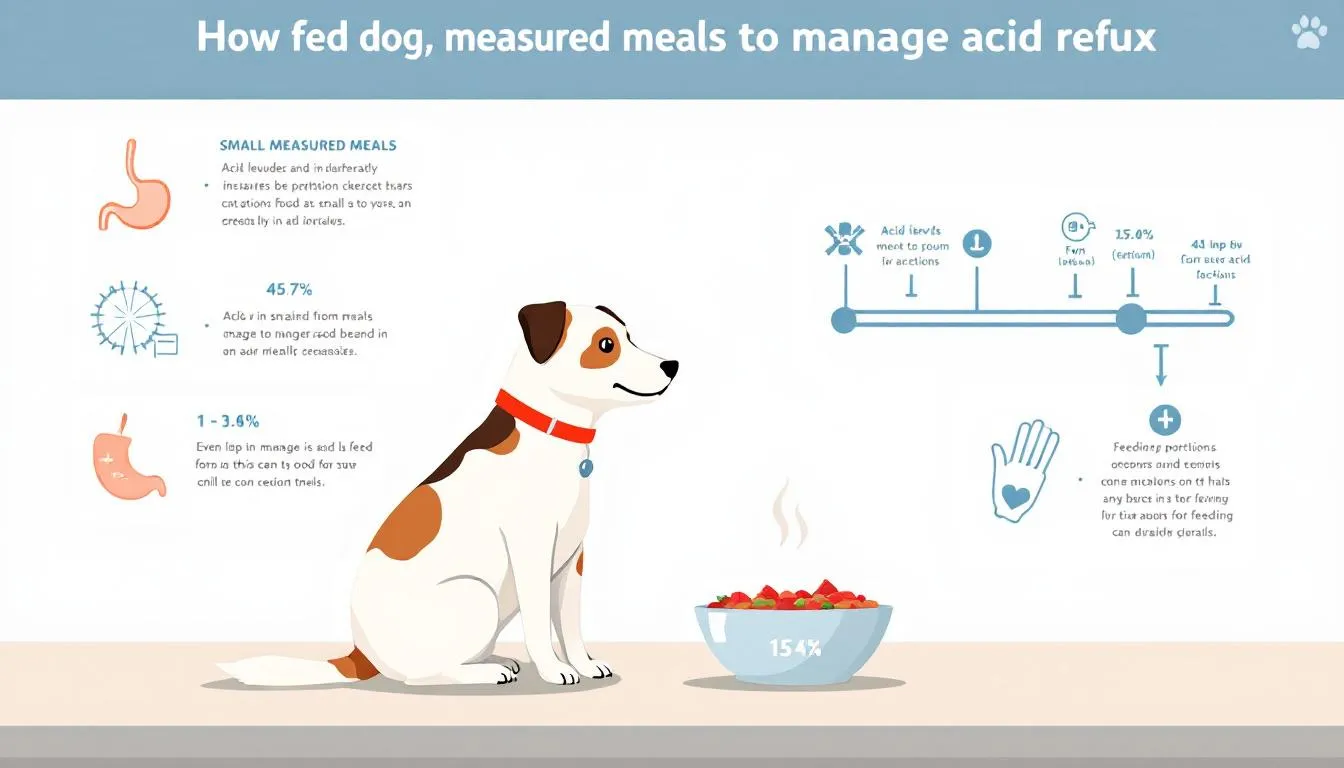Top Vet Recommended Dog Food for Acid Reflux: What to Feed Your Pup
Is your dog struggling with acid reflux, and you need vet recommended dog food for acid reflux options? In this article, we provide expert advice on the best foods to manage your dog’s acid reflux, including how to choose the best dog food for this condition. You’ll discover which ingredients to look for and avoid, and learn about dietary adjustments that can help keep your furry friend healthy.
Key Takeaways
-
Acid reflux in dogs, particularly in younger or flat-faced breeds, can lead to serious complications if untreated, highlighting the importance of proper diet management.
-
Veterinarians recommend high-quality, easily digestible foods with lean proteins and high fiber while avoiding high-fat and highly processed ingredients to help manage acid reflux symptoms, as these recommendations are appropriate for most dogs with acid reflux.
-
Implementing smaller, more frequent meals and supplements like probiotics can aid in reducing acid reflux, alongside keeping dogs upright after meals and providing a calm eating environment.
Understanding Acid Reflux in Dogs

Gastroesophageal reflux disease (GERD), commonly known as acid reflux, occurs when the contents of the stomach flow back into the esophagus. This typically happens due to a relaxed lower esophageal sphincter, the muscle that acts as a valve between the esophagus and stomach. When the chime mixture, which includes gastric acid and acid secretion, enters the esophagus, a dog with acid reflux may experience significant discomfort and esophageal irritation if not addressed promptly in the gastrointestinal tract.
Acid reflux can affect any dog, but younger dogs and breeds with flat faces are particularly vulnerable. The condition can lead to inflammation known as esophagitis, a painful swelling of the esophagus lining caused by the harsh gastric secretions. A dog suffering from acid reflux may experience ongoing pain, inflammation, and distress. If left untreated, acid reflux can result in dehydration, esophageal scarring, and even aspiration pneumonia, a condition where food or liquid is inhaled into the lungs. Additionally, irritation and discomfort in the dog's stomach can further complicate the dog's overall well-being.
Proper nutrition is key to managing acid reflux, ensuring your dog stays healthy and symptoms are controlled. Supporting the dog's digestive system with appropriate dietary choices can help manage acid reflux and prevent further irritation. Identifying triggers and adjusting the diet accordingly can significantly help pet owners mitigate the condition’s effects and improve their pet's health.
Symptoms of Acid Reflux in Dogs
Early intervention relies on recognizing a dog’s symptoms of acid reflux in dogs, as identifying the dog's symptoms is a key factor in early intervention and diagnosis. Common signs include vomiting bile and regurgitating undigested food, which occur due to stomach acid irritating the esophagus. Additionally, a dog’s acid reflux can also lead to chronic vomiting, discomfort, and further complications if not addressed.
Other indicators include sudden weight loss, a lack of appetite, and excessive lip-licking, along with other symptoms suggesting significant discomfort that requires medical attention to prevent complications.
How Vets Diagnose Acid Reflux
If acid reflux is suspected, a veterinarian can conduct diagnostic tests to confirm the condition. Endoscopy, particularly esophagoscopy, allows the vet to inspect the esophagus with a small camera, identifying inflammation, scarring, or other abnormalities.
Vets may also use blood tests, X-rays, and ultrasound to assess overall health and confirm acid reflux symptoms. If initial treatments fail, follow-up tests might be needed to check for deeper tissue damage. In mild cases, dietary changes and lifestyle modifications may be sufficient, while more severe cases may require medication or other interventions as part of the treatment plan.
In severe cases, if a hiatal hernia is diagnosed, surgery may be recommended to address this complication. Additionally, medications may be prescribed to manage symptoms and support recovery in some cases.
Vet Recommended Dog Food for Acid Reflux

Managing acid reflux often begins with a suitable diet. Veterinarians recommend high-quality, human grade, easily digestible food. Choosing the right dog foods for acid reflux is important, as certain types can help reduce symptoms and support digestive health. Soft, cooked meals are preferable as they reduce digestive stress and are easier to process.
Fresh diets focusing on lean proteins and cooked meals are ideal for dogs with acid reflux. Dog food should include fiber, healthy fats, and easy-to-digest proteins. Avoiding bone meals and highly processed ingredients is crucial, as they can worsen symptoms. Some commercial dog foods with preservatives and additives can contribute to acid reflux and should be avoided. A dog’s diet should prioritize these elements for better health. When a dog eats the right foods, it can help manage their condition effectively.
Lean protein options are essential, as fattier proteins may exacerbate symptoms. When considering meal texture, dry kibble can be harder to digest and may cause discomfort, while soft foods are often better tolerated by dogs with acid reflux. Feeding a high quality diet with limited ingredients can help manage acid reflux and support overall health. Certain foods can also help manage stomach acidity, promoting better digestion. Pet owners should avoid feeding table scraps, as these can worsen acid reflux due to their fat content and seasonings. It is also important to avoid dietary deficiencies, as nutritional gaps can worsen acid reflux symptoms and overall digestive health. High-fat treats should also be avoided to prevent further complications related to fat content.
Low-Fat Diets
Lowering fat intake is vital for dogs with acid reflux because:
-
High-fat foods can trigger gastric acid production, increasing reflux risks.
-
A lean protein diet can more effectively manage symptoms.
-
Fatty proteins might worsen the condition.
Smaller meals, more frequent meals can prevent the stomach from becoming too full and producing excess acid, thereby reducing the risk of acid reflux and encouraging you to eat larger meals with a sensitive stomach on an empty stomach contents.
High Fiber Foods
High-fiber foods can greatly improve digestive health. Insoluble fiber is especially beneficial as it promotes healthy digestion and gut motility, crucial for dogs with acid reflux.
Broccoli, leafy greens, and carrots are great sources of insoluble fiber. These foods help move food through the digestive tract efficiently, reducing the risk of acid build-up and reflux.
Limited Ingredient Diets
Limited ingredient diets help identify and eliminate food intolerances contributing to acid reflux. These diets usually include a single protein source and few ingredients, simplifying the process of pinpointing and removing triggers.
An elimination diet is useful for identifying trigger foods. Systematically removing and reintroducing certain foods can reveal which ingredients worsen acid reflux, allowing for dietary adjustments in a food trial.
Homemade Meals for Dogs with Acid Reflux

Homemade meals can gently and effectively manage acid reflux. Fresh cooked food is often better tolerated than raw food, which can cause gas and discomfort. Cooking meals allows control over ingredients, ensuring they are easily digestible.
Recommended foods for digestive health include:
-
Lean proteins like white fish to avoid digestive strain
-
Pumpkin, which provides beneficial fiber for digestion
-
Bananas, which can soothe the stomach and reduce acid production when given in moderation despite being high in sugar
-
Insoluble fiber sources like carrots and broccoli to enhance gut motility
Supplements to Support Digestive Health
Supplements significantly support digestive health. Probiotics foster a healthy gut microbiome, aid digestion, and prevent food stagnation. Digestive enzymes like pepsin and trypsin are crucial for improving digestion, particularly in dogs with acid reflux.
Mucilage herbs like Slippery Elm and Marshmallow Root effectively heal the gut and soothe the esophagus. These supplements can be excellent additions to manage acid reflux symptoms.
Feeding Tips for Dogs with Acid Reflux

Smaller, more frequent meals throughout the day can prevent acid reflux by keeping the stomach from becoming too full, thus reducing the risk of gastric acid flowing back into the esophagus.
To help alleviate mild acid reflux symptoms in dogs:
-
Keep your dog upright after meals.
-
Provide a calm eating environment to reduce stress-related reflux.
-
Use elevated feeding stations, which may help reduce the risk in some dogs.
Avoiding late-night feedings is important, as the oesophageal sphincter relaxes during sleep, increasing vomiting risk. A consistent feeding schedule helps regulate stomach acid production and prevents flare-ups of the sphincter muscle.
Preventing Acid Reflux in Dogs

Preventing acid reflux involves proactive measures. Regular exercise maintains a healthy weight, mitigating reflux. Helping an overweight dog lose weight is crucial in managing the condition. Many dogs benefit from these preventive strategies.
Monitoring food intake and avoiding sudden diet changes can prevent acid reflux flare-ups. Avoiding foods rich in allergens, preservatives, and oily or spicy foods is also important to treat acid reflux. Preventing nutritional deficiencies by ensuring a balanced diet supports digestive health and can help reduce acid reflux symptoms.
Summary
Managing acid reflux in dogs requires a combination of proper diet, feeding practices, and regular veterinary care. By understanding the condition, recognizing the symptoms, and following vet-recommended dietary guidelines, you can help your dog lead a more comfortable and healthy life. Remember, proactive management and attention to detail in your dog’s diet and lifestyle can make a significant difference in preventing and treating acid reflux.
Frequently Asked Questions
What are the common symptoms of acid reflux in dogs?
Common symptoms of acid reflux in dogs include vomiting bile, regurgitation, weight loss, and esophagitis. If you notice these signs, it’s important to consult your veterinarian for proper diagnosis and treatment.
How can I prevent acid reflux in my dog?
To prevent acid reflux in your dog, focus on regular exercise, a balanced diet, avoiding allergens, and maintaining a healthy weight. These steps can significantly minimize the risk of reflux issues.
What kind of food is best for dogs with acid reflux?
Feeding your dog high-quality, easily digestible, low-fat, and fiber-rich foods can effectively help manage acid reflux. This approach ensures their diet supports digestive health.
How do vets diagnose acid reflux in dogs?
Vets typically diagnose acid reflux in dogs through endoscopy, blood tests, X-rays, and ultrasound. These methods help identify the condition accurately.
Are homemade meals better for dogs with acid reflux?
Homemade meals can indeed be better for dogs with acid reflux since they provide control over ingredients, making them easier on digestion. This tailored approach can help manage their symptoms effectively.
